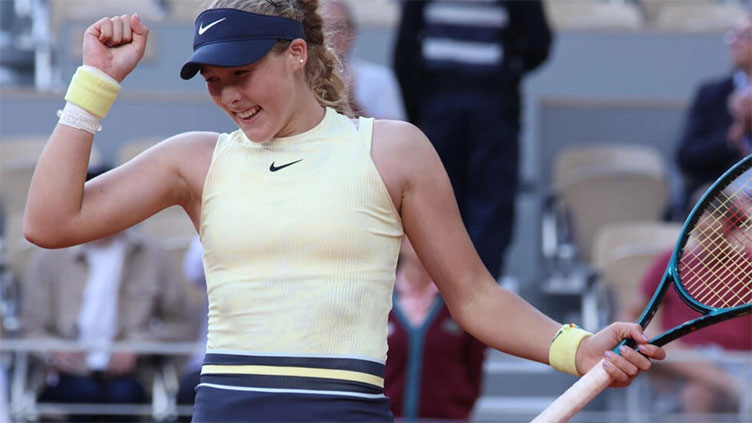Andreeva stuns Sabalenka, youngest Grand Slam semi-finalist since 1997

Sports
Mirra Andreeva beat Aryna Sabalenka 6-7 (5/7), 6-4, 6-4 on Wednesday.
PARIS (AFP) – Russian teenager Mirra Andreeva said it was a "dream" to become the youngest Grand Slam semi-finalist since 1997 with a shock victory over second seed Aryna Sabalenka, who was struggling with an apparent illness, at the French Open on Wednesday.
The 17-year-old fought back from a set down against her ailing opponent to win 6-7 (5/7), 6-4, 6-4 after two hours and 29 minutes and set up a last-four meeting with Italy's Jasmine Paolini.
Andreeva is the youngest woman to make the semis at a major event since Martina Hingis at the US Open 27 years ago and also the youngest at Roland Garros since Hingis in 1997.
"If we look back, I wouldn't expect myself playing semi-finals, because that was just kind of a dream for me in the beginning of the tournament, but now I will be playing semi-finals," said Andreeva, who had lost both her previous meetings with Sabalenka in straight sets.
She will fancy her chances of going all the way to the final when she faces Paolini -- who had never got past the second round at a Grand Slam before this year -- on Thursday.
Andreeva won her only previous meeting with Paolini earlier this year in the Madrid Open last 16.
"I remember that it was tough," she said of that match in April. "She played really good tennis, and I after was able to catch up a little bit. So yeah, I'm sure that it will be a great match."
Sabalenka called for multiple medical time-outs as she complained of not feeling well and Andreeva, playing in her maiden Slam quarter-final, eventually took advantage with a composed display.
Two-time Australian Open champion Sabalenka had powered through the first four rounds but was clearly having difficulties, breathing heavily between points.
Andreeva, currently ranked 38th, had already secured a breakthrough into the world's top 30 with her run to the last eight, but is now poised to rise further.
Tournament favourite Iga Swiatek plays US Open champion Coco Gauff in the other semi-final.
Sabalenka had been targeting a seventh straight Slam semi-final and had won 11 consecutive matches at the majors following her second Melbourne title earlier this year.
SABALENKA TOILS
It was immediately clear that Sabalenka was not at her best, as she made four double-faults across her opening two service games.
But Andreeva suffered from nerves in key moments, failing to serve out the first set when leading 5-4, before Sabalenka rallied to take a tie-break.
It appeared as though Sabalenka would race away from her young rival -- the youngest woman to make the quarter-finals since 2005 -- when she broke in the first game of the second set.
But Andreeva hit straight back, with Sabalenka continuing to shake her head and crouch down between points in apparent pain.
The pair traded breaks once more before Sabalenka again called for the trainer, saying she needed "something to make me feel better".
Andreeva was starting to get on top and levelled the match on her second set point as Sabalenka dumped a tired backhand into the bottom of the net.
Sabalenka was still grimacing and complaining towards her box early in the third set, but suddenly found her groove to break to love for a 3-2 advantage.
She could not back it up with a hold, though, as Andreeva quickly drew level and then moved 5-4 ahead.
"When I won second set and I was up in the score in the third, I was, like, 'Well, I'm closer... I'm really close to win'," Andreeva said.
"But the second I thought about that, I lost my serve and I lost her serve, so I was down in the score. So I just told myself, 'Don't think about that ever again. Just play, because when you just play and you don't think about anything, you play the best'."
Sabalenka failed to extend the contest behind her own serve as Andreeva sealed a famous victory in fine style, with a magnificent lob from way behind the baseline.


